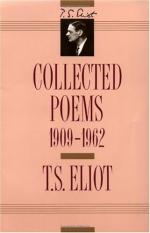|
This section contains 441 words (approx. 2 pages at 300 words per page) |

|
The Eliot of 'Gerontion' and 'The Hollow Men' … is a quasi-Absentist, his protagonists the seeming victims of an incapacitated faith. The poems tempt us to share despair—at least they feel their way into it with a relish. At the same time they allow us to infer that not faith but the protagonists are to blame. They may be said to refer Christian belief to the reader and even to judge and as it were wait to receive the repentant speakers, who meanwhile enjoy their backwardness. So somehow the 'sightless' hollow men know that a holy plenitude is possible for others—others have crossed the tumid river with 'direct eyes, to death's other Kingdom'. Their desert Absentist realm, with its belatedness, its impotency, is not then the only kingdom, the only death. Now for the Absentist, absence is irremediable and insuperable; it pervades and limits everything; the 'broken...
|
This section contains 441 words (approx. 2 pages at 300 words per page) |

|


